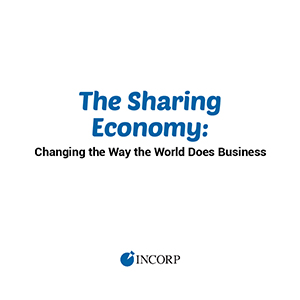The Sharing Economy
Changing the Way the World Does Business
Ride-sharing company Uber has been in the news a lot lately, but you may not realize how many other companies are now using business models based on the principle of people sharing their possessions with strangers for a fee. What's being called the "Sharing Economy" or the "Peer-to-Peer Economy" is actually a multi-billion dollar business that's building momentum every day, and it could eventually impact many different segments of the world's economy. Here are just a few examples:
San Francisco-based Uber bills itself as a technology company that connects drivers with people needing a ride. Using a smartphone, you contact Uber, give your location and your destination, and a driver is assigned to pick you up in a private car, often in a matter of minutes. All drivers are screened and must have late-model cars and auto insurance. Payment is made by smartphone, and Uber takes a percentage of the fee, with the remainder going to the driver. No tipping is allowed, and Uber encourages riders to rate their driver so that those with unsatisfactory ratings can be weeded out. Compare that to the average taxi experience, and you'll see why Uber has become a major success in cities around the world.
Other ride-sharing services using smartphone apps are also gaining popularity, especially in large cities where economies of scale make them practical. Sidecar, founded in San Francisco in 2012, formerly operated in 10 cities and has facilitated more than half a million rides. Its drivers can set their own prices, and passengers know the price of their ride before finalizing the deal. Lyft, while similar to Uber, suggests a donation at end of the ride instead of charging a set fee. Drivers and passengers can screen each other before the ride and rate each other afterward, so anyone generating bad reviews will eventually be unable to use the service.
One of the most successful sharing companies is Airbnb, which allows anyone with a house or apartment to rent it to others when they're out of town. Homeowners and renters connect through Airbnb's online service. Founded in 2008 in San Francisco, Airbnb is now available in 34,000 cities in 190 countries, renting everything from studio apartments to European castles.
Other variations of the sharing economy include: Lending Club, which links investors with people who need loans; TaskRabbit, an online site that provides workers for temp jobs such as cleaning, moving, and handyman services; and Feastly, which allows aspiring chefs to invite adventurous foodies into their kitchens.
How It's Changing the Way We Think
Powered by technology, both online and mobile, the sharing economy is gradually changing the way people think. For example, it's been argued that access is now more important than ownership--if you have access to a vehicle when you need it, why pay to own one? If you have access to a vacation home through Airbnb, why would you need to actually own one? There's a certain status to using these sharing services, especially among young people like millennials. Making use of underutilized assets (cars sitting in long-term airport parking, empty apartments while you're on a two-week vacation) fits in with their values of recycling and avoiding waste. Even more important, millennials are connected 24/7 through digital devices.
The social component also plays an important part in the success of this new economy. Communities are being built by those who use services like Airbnb and Uber, friendships are formed and connections made, often with people in other parts of the world. Just as Facebook, Instagram, YouTube, and other social networking sites link people who would otherwise not know each other, the sharing economy encourages the organic growth of groups who then become loyal to their new community.
Push-Back is Inevitable
Besides the problems inherent in placing your trust in strangers (people who don't perform a job as advertised, or who trash your apartment or your car), peer-to-peer services are facing opposition from conventional businesses whose markets are being affected. Major hotel chains don't have much to fear from Airbnb, and very few restaurant owners have even heard of Feastly, but taxi companies are another matter. In several cities, ride-sharing companies like Uber, Sidecar, and Lyft are facing stiff opposition from cab companies, which have always jealously protected their territories against interlopers. FlightCar has been sued by San Francisco officials who claim it breaks the rules for airport-based car rental companies, which are required to give the airport a cut of their fees.
Legal challenges will inevitably be part of the growing pains for the Sharing Economy, but as consumers embrace its ability to promote efficiencies, avoid waste and earn extra money, existing businesses will have to learn how to adapt to the new reality.
Stay in the know!
Join our newsletter for special offers.



